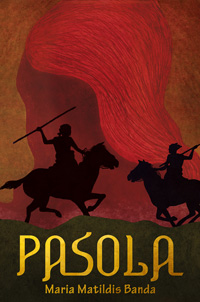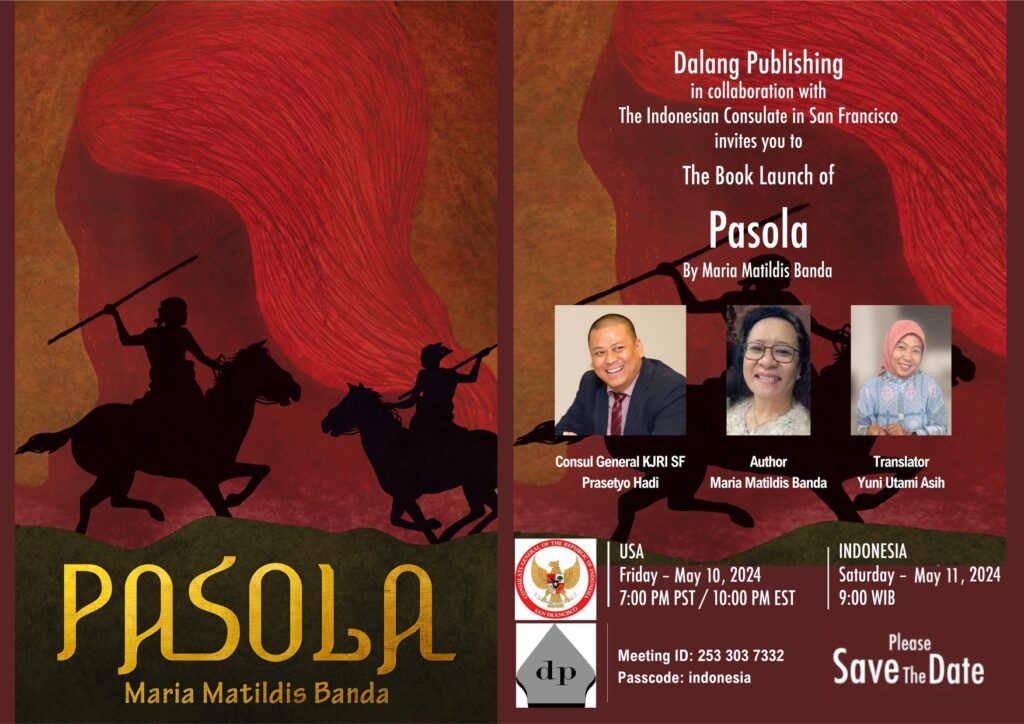The next evening Aimuna sat on the deck and stared into the distance across the ocean. They had stopped to rest. Gamati was bathing in the sea. Makela and Makasuli were preparing their meal. The younger men were checking and cleaning the boat, or helping Makela with the meal preparation. It was almost time for dinner.
Sobori slipped away to the deck. For a moment he just stood, watching his wife. Muna was oblivious of his presence. She stroked her round belly, thinking that the time to deliver the baby was near. Her contractions were becoming more frequent, with regular spacing in time. She tenderly whispered to the baby inside her to be calm since she was in pain.
Bori edged closer to Muna’s side and whispered, “Muna, when will our baby be born? We’ll be very happy having a child; someone to fulfill my parents’ wish.”
For a moment Muna startled, but she quickly calmed herself. She turned around to face Sobori. The ocean wind stroked the headscarf she wore to cover her shaven head.
She looked at Sobori with radiant eyes; she had not had a chance to look at her husband closely since she had returned from the fort on Saparua. She felt a surge of warmth and happiness coursing through her body, from her head to her toes. She had never experienced the sensation before; it was warm and invigorating.
Suddenly Bori pulled her into his arms and held her tight. He whispered close to her ear, “Muna, pray to Upulanite for the safety of our baby. If the baby is born at sea, then he or she will be a hero of the ocean, one who will possess great knowledge about our seas down to the bottom of this ocean.”
Muna did not know what to say. She was consumed by a yearning she had suppressed all this time. A thundering desire accompanied by deep gratitude rushed through her, coursed through her veins. “Bori, thank you. I hope nothing will separate us again, ever. Until the day we die.” Unable to fight her tears any longer, she sobbed on Sobori’s shoulder.
Sobori could barely contain himself. His wife’s words moved him and his eyes moistened. The idea of losing his wife forever was devastating. His tears were also tears of joy now that he had Aimuna in his arms again.
He first stroked Muna’s shoulder, then her head. He whispered tenderly, “My dear Muna, I hope we will have a peaceful life in our new kampong. We will be far enough from Pani-pani. We can plant some clove trees, save some gold. Then one day we will build an arumbae and sail to faraway places like Tuban and Makasar.”
Muna nodded. There were only Sobori, Grandpa Gamati, and also Grandpa and Grandma Ronasundu in her life. Makela was a new entity. She would rather die than live without them. She quietly cried in Bori’s arms, while Bori continued to caress her head and back.
They broke apart when someone called out that dinner was ready. They had boiled venison, some cassavas, and yams. Aimuna did not have an appetite, but Bori pleaded with her to eat for the sake of her baby and her own health. Muna could not resist Bori’s pleading and ate her portion of the meal. After dinner Muna started to have another series of contractions.
Makela went up to the deck. She knew Muna was going into labor and sat down by her. Bori refused to leave Muna, making the small deck even more cramped.
Makela had prepared all the things she needed for Muna’s delivery. She had torn some sarongs to make a makeshift cloth, mat, and blanket for the baby. She also had a pair of clean clothes for Muna, and some seawater, taken far from the beach, to wash the baby and Muna. They had no fresh water, and the torn sarongs actually belonged to other crewmembers; they were their spare clothes.
Muna continued to moan. Gamati sat down on the floor of the boat and chanted a mantra. The other young men, including Makela’s sons, climbed down the lepa-lepa and swam ashore. The older adults knew that delivering a baby was dangerous and could be a matter of life and death.
Sobori could not stand to hear Aimuna’s painful moaning. He told her to lie down and lay her head on his lap. It was unusual for a man to be with his wife during labor; however, this was an unusual situation. Bori needed to stand by his wife’s side during this crucial time. He remembered how Grandpa Gamati used to coach Aimuna when they were little and said, “Muna, darling, please be strong. You have to push hard. You’re a strong woman, I know you can do it.”
Makela murmured a mantra for Muna and the baby’s safe keeping.
Aimuna’s screams were getting louder; it was obvious that she was in great pain. Then, suddenly, Aimuna’s wailing was interrupted by the shrill cry of a newborn. No one dared to cheer as they were, after all, in a hiding place. They whispered their gratitude and joy. Little Kurubela had come into the world. The VOC had to face another opponent.
Makela was relieved that the delivery had gone relatively well. She washed the baby and wrapped him with the sarong she had prepared. The baby boy kept screaming in a loud and penetrating voice. He looked strong and healthy; his body was well proportioned, his hands and feet nimble. He had thick curly hair. Makela wrapped him tightly; they were in the open air and the wind was fierce.
Makela also washed Aimuna. She rubbed Muna’s body with an aromatic oil she had prepared with a mixture of mace, cloves, and other spices. The treatment would keep her warm and fragrant.
Muna stayed awake long enough to hear her baby’s loud cries, but then drifted into sleep. She was exhausted.
Sobori, happy and beaming, was surprised to see his wife silently lying with her eyes closed. He anxiously wondered why she did not move or show any sign of happiness. He suddenly panicked and blurted, “Muna! Dear Muna, why don’t you say something?”
“Shush, be quiet, Bori, Muna’s fine. She’s just exhausted. Let her sleep,” Makela calmed him.
Bori put his palm on his wife’s chest. He felt Muna’s heartbeat and whispered, “Ah, right. She only fell asleep, right?”
Relieved, Bori remained seated. Holding Muna’s head on his lap, he almost did not move. He was very touched by what his wife had gone through. After Muna awakened he washed everything that was soiled during his wife’s delivery.
Gamati said they should not throw the afterbirth in the sea but bury it in the ground instead. He feared that the blood would attract sharks. Aimuna had delivered a healthy baby boy, and everyone was relieved. Since they were not on land, it was their duty to protect mother and son from dangers and perils.
Makasuli shook his head as he looked at the baby who was born at sea, under the wide open sky. “What a brave boy you are, Son, choosing the sea instead of a clove plantation for your birthplace. I bet you want to be a captain just like your Grandpa Gamati,” he cooed and smiled when the baby puckered his mouth and waved his arms and feet in the air.
*****


